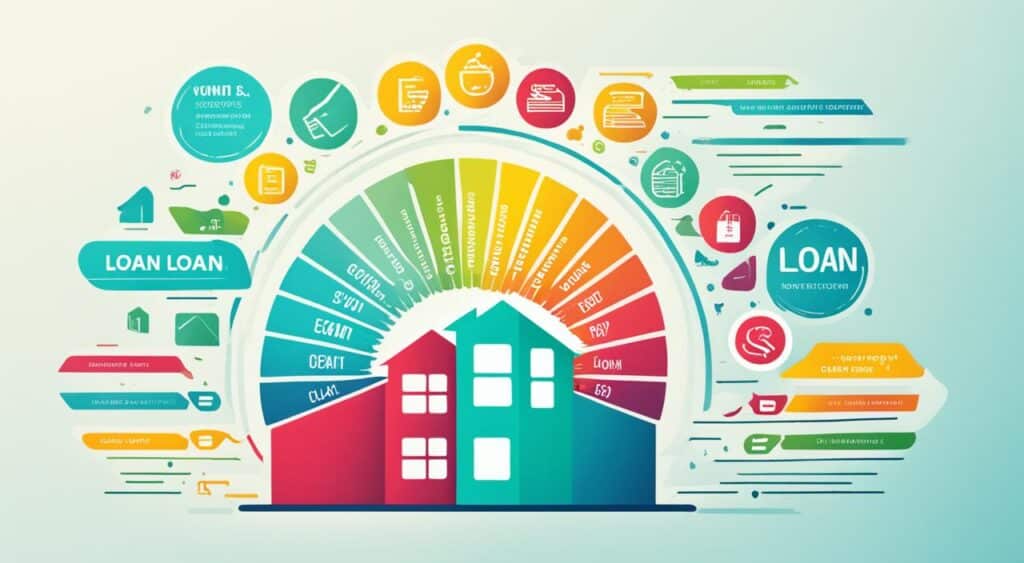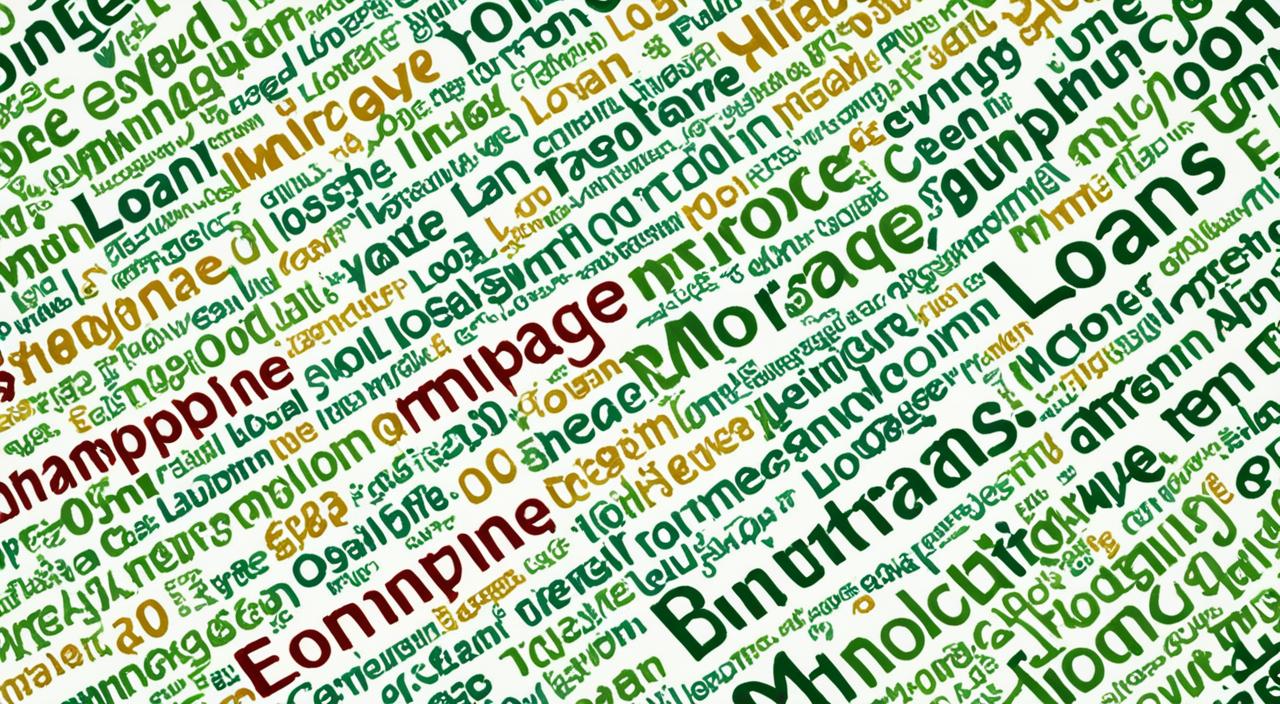When you need money for big buys, to pay off debts, or for school, many loan types can help. It’s key to know about various loans, what they offer, and how they fit your needs. This way, you can pick a loan that works well for your wallet. If you’re aiming for a personal, auto, or home loan, checking out your loan choices is the first smart move discover personal loans.
Loans come in three main groups: standard, backed by the government, and special programs. The kind of loan you pick affects things like how much you need for a down payment, your costs, and the max you can borrow. Standard loans are often cheaper, but they’re harder to get if you don’t have great credit or make a lot. Government-backed loans, including those from the FHA, VA, and USDA, let you put less down and accept lower credit scores. Special deals are also out there, like those for new homebuyers or folks working in public service credit histories.
Key Takeaways
- Loan options are organized into three main categories: conventional, government-backed, and special program loans.
- Conventional loans are the most common and typically cost less, but have stricter credit and income requirements.
- Government-backed loans, such as FHA, VA, and USDA loans, often require lower down payments and are available to borrowers with lower credit scores.
- Special program loans can be tailored to specific borrower groups, like first-time homebuyers or public service employees.
- Understanding the features and eligibility requirements of different loan types can help you select the best option for your financial situation.
Understanding Loan Types
Securing a loan offers several choices, each with specific features. The main loan types are conventional, government-backed, and special program loans. Knowing about these can help you choose what fits best with your financial plans and needs sofi personal.
Conventional Loans
Conventional loans are common and usually cost less than government loans. But, they have strict credit and income requirements. These loans are not backed by the government. So, lenders take more risk, which can lead to lower overall costs for borrowers affect your credit score.
Government-Backed Loans
Government-backed loans, like FHA, VA, and USDA loans, need smaller down payments and accept lower credit scores. They are insured by the government, making them easier to get for a broader group. This includes first-time buyers and those in public service personal loans come personal loans can be used.
Special Program Loans
Special program loans aim to help specific groups or meet particular needs. They’re available from state or local agencies, or private lenders. Mainly, they target first-time buyers, public servants, or those with low to medium incomes. These loans might have lower down payments, higher loan limits, and other features that aid in owning a home unsecured loans don’t require.
Loan Terms
When you’re looking at loans, the term is key. It’s the amount of time you have to pay it back. The term affects how much you pay each month, your interest costs, and your overall money plans loans don’t require collateral.
Short-Term Loans
Short-term loans, like 15-year mortgages, have low interest rates. This means you pay less interest overall. But, you’ll have to pay more each month because you’re paying it back quicker. It’s a good choice for those who like saving by paying less interest over time. Just make sure you can handle the bigger monthly bills personal loan funds.
Long-Term Loans
Now, longer loans, like 30-year mortgages, mean you pay less every month. However, you’ll end up paying more in total interest. This is because the payment period is longer, and the interest adds up. It’s about finding the right balance for you between monthly payments, interest rates, and the loan’s total length personal loan funds.
Interest Rate Options

Borrowers usually pick between fixed-rate and adjustable-rate loans. Knowing the differences is key. It helps in deciding the best fit for your financial needs and future goals small personal loans.
Fixed-Rate Loans
With fixed-rate loans, your interest rate stays the same for the full loan term. This keeps your monthly payments stable. It’s a good choice for those keeping the loan for a long time. They won’t have to worry about rising interest rates. Fixed-rate mortgages and big buys often go this route for long-term budget reasons personal loans typically.
Adjustable-Rate Mortgages (ARMs)
Adjustable-rate mortgages (ARMs) start with a period of fixed rates, then adjust. Your monthly principal and interest payment can change as the interest rate does. ARMs can be cheaper early on, but they might cost more later. This is due to interest rate caps and the possibility of rising long-term costs one personal loan.
When choosing a loan, think about your goals and how long you’ll have it. Also, consider if you’re okay with payments changing. This will guide you to either a fixed-rate or adjustable-rate loan that suits your situation personal loans are available.
Loan Options

Loans serve many purposes, like buying big items, combining debts, or paying for school. Common types are personal loans, auto loans, student loans, and more. You’ll also find payday loans, secured loans, and other types for different needs best personal loan for bad.
Personal loans are very flexible, useful for urgent bills, debt merging, or house fixes. Auto loans, meant for buying cars, and student loans for college costs are specific types. Mortgage loans buy homes, while home equity loans let owners borrow against their homes’ value borrowers with excellent credit.
Some loans, like auto and home equity loans, are cheaper because they use your item as security. Personal loans rely on your credit score and don’t need a guarantee. They come with different repayment plans. For example, while auto loans are paid off over time, credit cards provide a continuous source of money receive a personal loan.
The best loan for you depends on your financial aims, credit status, and how you’ll use the money. It’s important to compare loan details to make a smart choice personal loans are unsecured.
Personal Loans

Personal loans are a great way to get money for a range of things. You can use them for quick needs, to bring your debts together, to fix up your house, or to pay for a wedding. There are mainly two types: unsecured and secured personal loans.
Unsecured Personal Loans
Unsecured personal loans are quite popular. They don’t need any collateral. This means your credit score and your promise to pay are what matter. Even though they might cost more to pay back, they give you more freedom. You don’t have to risk personal items like your car or house personal loan to finance.
Secured Personal Loans
Secured personal loans work a bit different. You need to offer something like your car or house as a backup if you can’t pay. Doing this lowers the lender’s risk, so rates might be lower loans and credit cards. They’re good for bigger buys or if your credit isn’t the best for an unsecured loan.
When picking a personal loan, think about why you need it and how much it will cost. Choose the one that fits best with what you can afford. No matter if it’s for lowering debt, making your home better, or if something urgent pops up, personal loans are a solid choice to help you meet your money goals use a personal loan calculator.
Auto Loans
Looking to buy a car? Auto loans are a top choice for many. These secured loans are tied to the vehicle you buy. This means interest rates can be lower than other types of loans lenders that offer personal loans.
The amount you can borrow and the interest you’ll pay are based on several things. These include the car’s cost, how long you want to pay back the loan, your credit score, and your down payment amount. Loan terms usually range from 3 to 7 years offer personal loans to determine.
If you have good to excellent credit, you might get a good deal. But if your credit’s not so good, you might face higher rates. Auto loans help make buying a car doable, even if you can’t pay the full price upfront loans to determine the overall.
Auto loans are key in letting people own cars. They help break down the cost over time. And, thanks to being secured loans, they often come with better interest rates.
| Loan Type | Interest Rates | Loan Terms | Down Payment | Credit Score Requirements |
|---|---|---|---|---|
| New Car Loan | 4.5% – 8.5% | 3 – 7 years | 10% – 20% | Good to Excellent |
| Used Car Loan | 5.5% – 10.5% | 3 – 5 years | 10% – 20% | Fair to Excellent |
| Refinance Loan | 3.5% – 7.5% | 3 – 5 years | No down payment | Fair to Excellent |
Student Loans
Student loans help people pay for college. They cover many costs like tuition and living expenses. There are two kinds of student loans: federal and private approved for a personal loan.
Federal Student Loans
The U.S. government offers federal student loans. They are typically cheaper and easier to manage. You can get different types, depending on your needs, like Subsidized, Unsubsidized, or PLUS Loans looking for a personal loan.
Federal loans have options to help if you can’t make payments. These include plans based on what you earn and the ability to pause payments. This makes them a better choice for many borrowers personal loans to borrowers.
Private Student Loans
Banks, credit unions, and similar lenders offer private student loans. They consider your credit score for approval and to set interest rates. Having someone else sign the loan can help your chances and terms funding within one.
Private loans might not offer the same flexible payment plans as federal loans. But they can fill the gap left by scholarships or federal aid. They’re useful for covering what’s left of your education costs personal loans rating methodology.
No matter the loan type, understanding the interest, terms, and total cost is key. This knowledge helps students make smart choices. It ensures their educational and financial needs are met well picks for best personal loans.
Mortgage Loans

Mortgage loans are a big deal for many folks. They are grouped into three main types: conventional, government-insured, and special program loans. These options are for different kinds of borrowers, each with their own rules and benefits.
Conventional Mortgages
Conventional mortgages are the usual home loans. They usually cost less than the ones backed by the government. Yet, they need better credit scores and income levels. To get the best rates, you might need a higher credit score and lower debts.
Government-Insured Mortgages
Government-insured mortgages help more people buy homes. Loans like FHA, VA, and USDA need smaller down payments and accept lower credit ratings. Thanks to the government’s backing, lenders can give nicer terms to these borrowers. This includes folks with little down payment savings or not-so-great credit.
Jumbo loans are for really expensive properties. They have their own rules since they’re bigger than usual. Lenders check these loans more closely.
No matter the mortgage, remember to consider interest rates, loan terms, and closing costs. These factors really affect how much your home loan will cost. Think about your finances and what you want long term before choosing a mortgage type.
Also Read: How Can I Get A Startup Business Loan?
Conclusion
The many types of loans out there can feel overwhelming. But, if you learn about the main features and differences, you can decide wisely. This understanding helps match a loan to your financial goals.
If you need a loan for a big buy, to combine debts, or to pay for school, there are choices. You’ll find loans with different interest rates, time to pay back, and how they must be secured. Thinking about these details will guide you to the best option for your money.
Choosing the best loan for you comes down to what you truly need and your finances. Knowing your options well allows you to pick a loan that helps you in the long run. It lets you reach your financial dreams.
FAQs
Q: What are the best personal loan options available in 2024?
A: To find the best personal loan options in 2024, you can compare personal loans from various lenders based on factors such as personal loan interest rates, loan amount, credit score requirements, and loan terms.
Q: How can I get a personal loan for home improvement?
A: You can apply for a home improvement loan, which is a type of personal loan specifically designed for funding home renovation projects. These loans typically offer competitive rates and can be used to finance various home improvement expenses.
Q: Can I get a personal loan if I have bad credit?
A: While it may be more challenging to qualify for a personal loan with bad credit, there are lenders who offer personal loans for bad credit borrowers. These loans may have higher interest rates and stricter terms, so it’s essential to compare options carefully.
Q: What is the difference between a secured and unsecured personal loan?
A: A secured personal loan requires collateral, such as a car or savings account, to back the loan. In contrast, an unsecured personal loan does not require collateral but may have higher interest rates to compensate for the increased risk to the lender.
Q: How does taking out a personal loan affect my credit score?
A: When you apply for a personal loan, the lender will conduct a hard credit inquiry, which can temporarily lower your credit score. However, making timely payments on the loan can positively impact your credit over time.
Q: Where is the best place to get a personal loan?
A: The best place to get a personal loan will depend on your specific financial situation and needs. You can compare offers from traditional banks, credit unions, online lenders, and peer-to-peer lending platforms to find the most competitive rates and terms.
Q: Can I use a personal loan for debt consolidation?
A: Yes, personal loans are commonly used for debt consolidation, where you combine multiple debts into a single loan with a potentially lower interest rate. This can help simplify your finances and save money on interest payments.
Source Links
- https://www.consumerfinance.gov/owning-a-home/explore/understand-the-different-kinds-of-loans-available/
- https://www.consumerfinance.gov/owning-a-home/explore/select-the-kind-of-loan-that-fits-your-needs/
- https://www.experian.com/blogs/ask-experian/types-of-loans/





